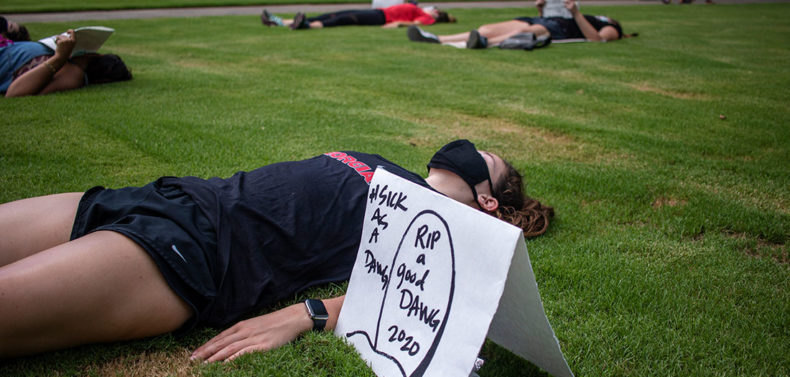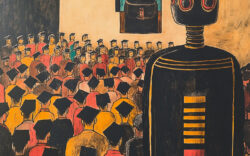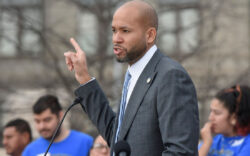Georgia Southern University sophomore Clara Jordan watched nervously as her classmates walked the campus with their masks slung under their noses or strapped on their chins.
“I don’t feel the majority of students are aware, or are choosing to ignore it, given their actions,” she said of the threat the ongoing pandemic poses to the college town of Statesboro. “Those that do know, myself and my friends included, are very nervous about it. One of my roommates is immunocompromised and has breathing issues, so I live in a very real fear of catching it due to Georgia Southern’s negligence and bringing it home to them.”
Sitting through class is different, as well, Jordan said. Some of her classes are held online, but others, like her weekly biology lab, require a trip to campus. Once a week she makes the 20-minute drive from her off-campus home, walks 30 minutes from her parking spot to the biology classroom and sits down for a lesson that lasts only 10 minutes.
“Basically, we enter the classroom, get a bare-bones explanation of the lab, then are dismissed to do it online using simulations. These labs don’t mirror the labs in the lab manual at all, either, which we were still required to buy,” she said. “It’s an hour out of my day I could have spent on homework for other classes.”
Fear and frustration have marked the start of the fall semester for college students and employees across the state as COVID-19 disrupts the usual routines of college life. More than 2,000 students and employees across the state have tested positive since classes began last month, according to data reported voluntarily by the universities. The University of Georgia’s most recent weekly batch of statistics, released Sept. 2, included 821 positive tests, four times the number from the previous week.
Keeping Count
Determining the number of COVID-19 cases in Georgia colleges can be a challenge, said Georgia State University public health professor Harry J. Heiman. There is no standardization across the University System of Georgia’s colleges and universities, he said. “So while you would hope that there would be some state-level leadership around creating guidance in uniform testing and reporting, in fact, it’s been kind of like every other aspect of how we’ve managed this pandemic at the state level: Every institution for themselves,” Heiman said.
The system has directed institutions “to provide information they feel is most appropriate for their campus community” while adhering to privacy laws, said USG spokesman Aaron Diamante. “USG constantly evaluates a variety of on- and off-campus factors and continues to follow COVID-19 guidance from the Georgia Department of Public Health, CDC and the Governor’s COVID-19 Task Force,” Diamante said.
Not every institution is reporting the number of cases; those that do often follow different procedures. Some universities—like Georgia State, UGA and Georgia Tech—are asking asymptomatic students to come and be tested, to help gain an understanding of the campus-wide situation.
Georgia State, for example, is selecting about 300 students per week to be tested and using the results to discern the likely spread of the disease on its campus, Heiman said.
“At the University of Georgia, they’ve adopted the same approach of testing a small number of students, to allow them to assess what’s going on more broadly, but rather than doing that randomly, they’re allowing students to volunteer to be sampled, which itself significantly biases your sampling process and doesn’t really give you a representative sample that you can then draw broader conclusions about,” he said. “So it’s very confusing, even for me, to look from one university to another and try to extrapolate and understand exactly what those numbers represent.”
Further complicating matters is the question of where cases are counted. A positive count is listed geographically based on the student’s address, which could be a dorm, an off-campus home or their parents’ house.
It’s important for experts to be able to keep track of the disease’s spread in colleges, not just for the sake of students but to protect the wider population, Heiman said. “There’s this narrative that, well, it’s college students, and they’re young and healthy, and it’s rare for them to end up sick in the hospital. So if a few college kids get sick, it’s not a big deal. But the reality is what we’re seeing is outbreaks in fraternities, outbreaks in residential settings, and what happens when they send them home to isolate? They’re with their family, including older people and family elders, who were at greater risk.”
Campus workers are also likely to be at a higher risk, Heiman said.
No student deaths have been reported, but at least two University System of Georgia employees have died from complications of COVID-19, according to Georgia Southern University’ student newspaper, the George-Anne. “We’re hearing a lot about students but very little about faculty and staff, and staff in particular is not only at high risk based on many of their jobs that require them to be present in multiple areas around the university setting but also, if you look at the people who are doing those jobs, they’re disproportionately Black and brown and from those communities that we already know are being disproportionately impacted by the pandemic,” Heiman said.
The lack of uniform data has led some to try to track COVID-19 cases at colleges and universities on their own, including University of North Georgia rhetoric professor Matthew Boedy, who has been updating a public Google Doc with case tallies and information from several USG institutions.
“We would hope that the USG would have some sort of mandate for all the colleges: (a), to publicly disclose numbers, and (b), do it in the same manner—but that’s just not happening,” Boedy said. “It’s really hard to follow what is happening. So if the USG is indeed not doing it, then someone else has to do it.”
Boedy said he began compiling numbers from different universities so his colleagues and students around the state could get a sense of how the disease is spreading on college campuses. He is also interested in learning the circumstances under which schools will independently switch to online lessons, since the USG has not established an infection threshold that would trigger a shift to online classes.
“They’ve said time and time again, both in public and private, that they don’t have a threshold or they’re not paying attention to the numbers or there’s no statewide accounting that they’re doing,” he said. “And so I wanted to try to figure out what would be the threshold. Would it be 100? Would it be 500? Would it be a certain amount of people in a certain place or a certain percentage testing positive? We’re just trying to keep track of the cases to just show everybody else what the USG should be saying to us, which is what’s the threshold?”
Party Time
Some college administrators have placed the blame on partygoers for undermining attempts to slow the spread of the virus by gathering en masse for off-campus carousing.
An Aug. 15 video of hundreds of students partying in the street at UNG’s Dahlonega campus before classes began made national headlines and worried faculty, Boedy said. “We knew that a spreader event had happened there, and so we waited for the cases to rise,” he said. “But while we only have 114 reported cases at UNG, there’s no testing going on whatsoever. So you really don’t know how far that particular event spread.”
Parties also preceded Georgia College’s spike in cases, university president Steve Dorman said in an Aug. 25 email to students. “Unfortunately, but not surprisingly, we have seen an increase of COVID-positive students directly linked to off-campus parties and gatherings, which continue to occur,” Dorman wrote. “This activity is totally unacceptable and needs to stop immediately. It endangers the safety of others and threatens to prevent the desire of most of you to remain together here at GC for the semester.”
Students who are found to be engaging in conduct “that constitutes a danger to the personal safety of other members of the university community” could face suspension, Dorman said.
Downtown Athens is packed with party-seeking students Thursday through Saturday nights, said University of Georgia junior Arianna Mbunwe. “The people who are going out are wearing masks but are standing close together cramped in bars,” she said. “It makes me pretty upset because I can’t do anything other than tell them not to.”
Mbunwe, who is executive director of the UGA Young Democrats, is among the students across the state speaking out about campus life in the age of COVID-19. Her Twitter account is filled with screenshots of text messages she says are from UGA students and employees talking about problems with the school’s COVID-19 plans. One claims to be from a dining employee who was told not to tell students that other employees have COVID-19. Another purports to be from a teaching assistant who was told not to tell students if a classmate tested positive.
“It all started after I posted the anonymous tip about dining employees, then that opened the floodgates,” she said. “I also tweeted that I would share any tip that was DMed to me because I knew a lot of people could get in trouble with their supervisors if they told themselves.”
Mbunwe said she’s gotten about 30 such messages so far. “I just wanted people to know the unfiltered truth, and I get peace of mind out of it,” she said. “And also, I know I’m doing the right thing.”
This story originally appeared in the Georgia Recorder, georgiarecorder.com.
Like what you just read? Support Flagpole by making a donation today. Every dollar you give helps fund our ongoing mission to provide Athens with quality, independent journalism.










